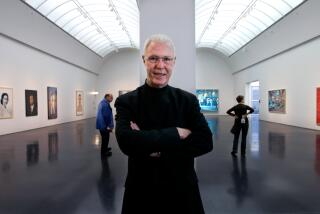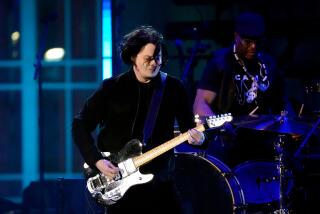Mayor Urges Using Potential Arts Festival Profits for Youth Programs
- Share via
Linking two of her pet projects in an optimistic economic scenario, San Diego Mayor Maureen O’Connor on Thursday recommended that a potential $1-million profit from this fall’s Soviet arts festival be used to avoid cutbacks in after-school recreation and other youth programs.
In a two-page memo to her City Council colleagues, O’Connor urged that proceeds from the three-week arts festival in San Diego be earmarked for city-funded children’s programs tentatively scheduled for budget cuts in the fiscal year to begin July 1.
Although the mayor’s desire to preserve various youth programs drew a favorable response Thursday from several council members, some of them questioned the wisdom of depending on still-speculative profits from the arts festival to underwrite those key services.
“I guess my first reaction was, ‘What profits?’ ” City Councilwoman Judy McCarty said. “I’d like to have the money in hand before we start making promises. And to this point, the thinking has been that we might be lucky to not lose money, much less make $1 million on the festival.”
Reservations Cited
However, mayoral staffers and festival officials, pointing to encouraging ticket reservations and projected merchandising revenue, described the $1 million profit figure as a realistic--perhaps even conservative--estimate for the Oct. 21-Nov. 11 event. The $6-million cultural affairs festival will feature folk art, theater, films, religious icons and more than two dozen of the famous bejeweled Faberge Imperial eggs.
“I believe we can resolve the children’s program funding crisis by wedding the virtues of art and children to increased tourism and profit (resulting from the festival),” O’Connor wrote in the memo.
Long a staunch advocate of youth programs, the former schoolteacher argued that, the city’s severe budget constraints notwithstanding, cutbacks in those programs would be particularly ill-advised this year, which she declared the “Year of the Child” in January’s State of the City address. Although O’Connor did not mention it in Thursday’s memo, such cutbacks also could be politically embarrassing.
“In the ‘Year of the Child’ we cannot possibly abandon our commitment to the after-school recreation program, the summer water safety and portable pool program, the bookmobile and other efforts that serve the developmental needs of tens of thousands of our children,” O’Connor said.
$577,000 Cut Proposed
In the proposed $931-million fiscal 1990 budget that he unveiled last month, City Manager John Lockwood recommended a $577,000 reduction in after-school recreation programs that would eliminate half of the 74 sites and a $205,000 cut to be achieved by closing eight city-run pools for nine weeks in the fall and spring. Under Lockwood’s proposal, library hours also would be curtailed in several neighborhoods and a city bookmobile would be taken off the streets.
To find additional money to meet the council’s overriding goal of expanding the city’s police force, Lockwood is expected to outline in another budget memo today deeper cuts in youth-oriented programs.
O’Connor, however, argued vigorously that budget-cutters should look elsewhere in their search for scarce dollars to bolster police manpower levels. Those “pressing police needs” could be addressed, O’Connor said in the memo, through cuts in other unspecified areas, early paybacks on downtown redevelopment debts, and state and federal grants.
Cutbacks in the youth programs could even have the ironically unfortunate consequence of increasing crime problems, O’Connor said, noting that the programs “provide children with alternatives to the dead end of gang membership.”
Endorsed Objective
Council members interviewed Thursday strongly endorsed O’Connor’s objective of protecting the youth programs from severe budget cuts. However, while sharing the mayor’s goal, they questioned her proposed method of accomplishing it--in the process, showing that that they remain skeptical about O’Connor’s rosy forecast for the festival.
“Those kids’ programs would be one of the things at the top of my list to continue,” Councilman Ron Roberts said. “My major concern is that there’s no guarantee this profit from the festival is going to materialize. I’d rather find a guaranteed source of funding to keep these programs alive.”
McCarty added: “If there are $1 million in profits, we’ll be absolutely thrilled, and many programs will be standing in line to spend that money. But that still seems optimistic to me. I don’t want to take the chance. What happens if there are no profits?”
Confident of Profit
O’Connor’s aides and festival executives, however, insist that they are increasingly confident that the festival--financed in part with $3 million in public funds allocated by the council--will finish in the black.
Bruce Herring, the festival’s executive director, said Thursday that the projected $1-million profit is based on revenue from advance ticket sales, lower-than-expected costs for expenses such as air fare for the Soviet artists, and a percentage of funds from T-shirts and other merchandise to be sold during the festival by merchants licensed by the city.
City officials also anticipate that additional revenue will be realized through private evening showings of the Faberge eggs, icons and folk art to be marketed to corporations, Herring said. Moreover, festival directors forecast that the city will benefit through more than $35 million in so-called “indirect revenue” spent by festival visitors for hotels, meals and other purposes.
“Every early sign indicates that (the festival) will be a resounding success,” O’Connor said in the memo. “How appropriate, then, that the revenue originally generated by a tourist tax will bring San Diego priceless art exhibits and even more tourism, and then eventually produce proceeds to underwrite our children’s needs . . .”
Council Uneasy
While acknowledging that O’Connor has monitored the festival’s planning more closely than they have, council members said they remain to be convinced that the mayor’s optimism about its economic outlook is merited. Customary budgetary caution and their ardent support for the youth programs, they explained, combine to leave them somewhat uneasy about relying too heavily on the festival’s projected profit.
“The mayor sounds pretty confident that that $1 million is going to be there,” Roberts said. “If it turns out that’s the only money available for the children’s programs, fine. But I guess I’d just feel more comfortable using funds we’re certain about. Any revenue or profit from the festival is going to be speculative for at least another six months. I don’t want to leave these kids’ programs hanging on the line.”
More to Read
The biggest entertainment stories
Get our big stories about Hollywood, film, television, music, arts, culture and more right in your inbox as soon as they publish.
You may occasionally receive promotional content from the Los Angeles Times.










